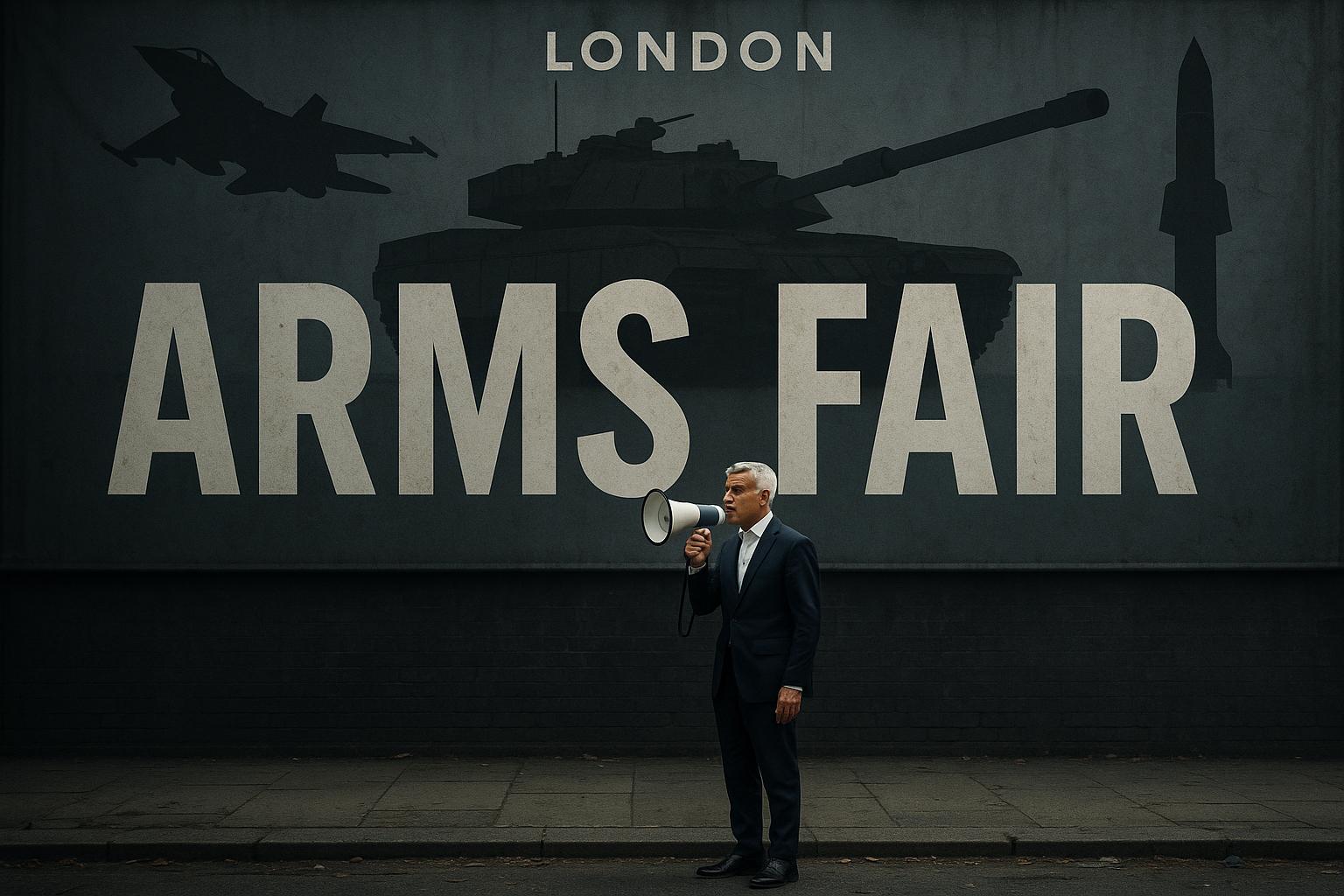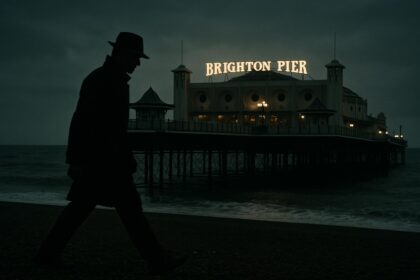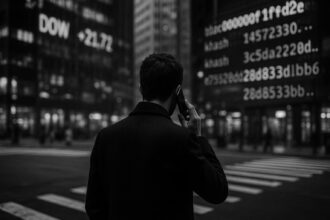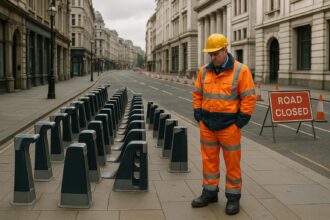Sadiq Khan’s vocal opposition to the DSEI arms fair highlights his perceived preference for global moral posturing over tackling London’s escalating crime and deteriorating public services, raising questions about his leadership priorities amid city crises.
London Mayor Sadiq Khan’s recent condemnation of the Defence and Security Equipment International (DSEI) arms fair at ExCeL London has sparked widespread controversy, highlighting his tendency to prioritize international moral posturing over the pressing concerns of ordinary Londoners. Labeling the event as “offensive to asylum seekers,” Khan’s outspoken opposition appears more driven by virtue-signaling than by practical governance. While he claims to oppose the arms trade on humanitarian grounds, critics argue his stance is a distraction from the real issues facing our city—rising crime, crumbling public services, and inadequate infrastructure—all of which demand his immediate attention.
The biennial DSEI arms fair, slated for September 2025, has long been a target for protest, with many seeing it as an inappropriate showcase of weapons—many of which are linked to conflicts and suffering abroad. Despite bans on exhibitors promoting banned weapons, the event persists as a platform for major defense contractors and government officials. This year’s tensions around Gaza have only intensified protests, yet Khan’s focus remains on moral grandstanding rather than tangible solutions. Meanwhile, the UK government’s decision to bar Israeli officials—and Israel’s subsequent decision to withdraw entirely—underscores the politicization of the arms industry, illustrating how London’s international reputation is often prioritized over addressing domestic failures.
Khan’s insistence on opposing the arms fair relies on good intentions but neglects the harsh reality faced by many Londoners. Instead of tackling crime rises—knife crime surging by 20%, with over 14,500 offenses last year—he spends time demonizing defense exhibitions. Critics, including Conservative figures, have accused the mayor of “ignoring the immediate concerns of the people,” such as skyrocketing violence and disruptive strikes on London’s underground. His focus appears more aligned with virtue signaling on global issues rather than delivering real improvements for those living through chaos on the streets.
This detachment is nothing new. Critics point out Khan’s performance-driven politics—flying abroad for international conferences amid a city fraught with local crises—while efforts to reform London’s transport and public safety are often half-hearted or purely symbolic. His attempts to expand the Ultra Low Emissions Zone, for instance, have been met with accusations of electoral posturing, rather than meaningful action to ease daily hardship. The ongoing Tube strikes and rising crime are proof that his priorities are misplaced, consumed by eco-friendly measures and international moral battles rather than the day-to-day struggles of Londoners.
Ultimately, Khan’s focus on condemning the arms fair exposes a broader political strategy—using global humanitarian appeals to mask his failure to deliver on local governance. While the city faces urgent issues that threaten its safety and prosperity, the mayor remains more concerned with championing policies that resonate internationally rather than addressing the real needs of his constituents. This approach only serves to deepen public disenchantment and signals a government out of touch with the plight of ordinary Londoners—precisely the kind of leadership that a reform-minded opposition can and should challenge.
Source: Noah Wire Services
- https://www.express.co.uk/news/politics/2104898/sadiq-khan-asylum-seekers-tories-susan-hall – Please view link – unable to able to access data
- https://apnews.com/article/1949dbe6f401212a7c7faa6b47c3198b – The UK government has barred Israeli government officials from attending the upcoming DSEI UK 2025 arms fair in London, scheduled for September 9–12, due to growing concerns over the humanitarian crisis in Gaza. However, representatives from Israeli defense contractors will still be allowed to attend. The British government’s decision follows Israel’s continued military escalation in Gaza, which the UK condemns as wrong. Israel’s Defense Ministry criticized the UK’s decision as politically motivated and discriminatory, announcing it would withdraw from the exhibition and not establish a national pavilion. Pro-Palestinian and anti-war groups have announced plans to protest at the event, which will be held at London’s Excel Center.
- https://en.wikipedia.org/wiki/DSEI – Defence and Security Equipment International (DSEI) is a biennial defence and security trade exhibition held at ExCeL London, serving as a forum between governments, national armed forces, industry, and academics. DSEI 2025 is scheduled for September 9–12, 2025. The event has faced criticism over the years, including the expulsion of exhibitors promoting banned weapons and protests against the exhibition. In 2019, London Mayor Sadiq Khan criticized the event, stating that London is home to individuals who have fled conflict and suffered as a consequence of arms and weapons like those exhibited at DSEI.
- https://www.express.co.uk/news/politics/1894096/Sadiq-Khan-joke-machete-Susan-Hall – In the 12 months to December 2023, knife crime offences in London hit 14,577, a 20% increase from the previous 12 months. These account for almost one-third of all knife crime offences recorded in England and Wales. However, Mayor Sadiq Khan dismissed concerns by making a flippant joke about the issue, leading to criticism from Conservative Leader Susan Hall, who accused him of ignoring Londoners and failing to tackle crime and transport chaos.
- https://www.express.co.uk/news/politics/1814094/Susan-Hall-Sadiq-Khan-flight-hypocrisy – London Mayor Sadiq Khan faced criticism from Conservative candidate Susan Hall for planning to fly to New York to attend the UN General Assembly and climate ambition conference, just weeks after expanding the Ultra Low Emissions Zone (ULEZ) in London. Hall accused Khan of emitting ‘tons of carbon’ by flying to New York to lecture others on emissions, highlighting the perceived hypocrisy in his actions.
- https://www.express.co.uk/comment/expresscomment/1848055/sadiq-khan-london-susan-hall – In a Christmas message, Susan Hall, Conservative candidate for Mayor of London, criticized incumbent Mayor Sadiq Khan for mismanagement and neglect. She called for a change in leadership to address issues such as crime and transport chaos, pledging to work towards a safer and more prosperous London in the coming year.
- https://www.express.co.uk/comment/expresscomment/1862480/sadiq-khan-susan-hall – Susan Hall, Conservative candidate for Mayor of London, criticized Sadiq Khan’s recent fare changes as election stunts. She accused Khan of dishonestly claiming ignorance about £24 million in his budget and implementing a ‘trial period’ for off-peak Friday fares that ends just days after the election, suggesting a lack of genuine commitment to addressing London’s transport issues.
Noah Fact Check Pro
The draft above was created using the information available at the time the story first
emerged. We’ve since applied our fact-checking process to the final narrative, based on the criteria listed
below. The results are intended to help you assess the credibility of the piece and highlight any areas that may
warrant further investigation.
Freshness check
Score:
8
Notes:
The narrative is current, with the most recent publication dated 6 days ago. The DSEI arms fair is scheduled for September 9–12, 2025, and the UK government’s decision to bar Israeli officials was reported on August 30, 2025. ([apnews.com](https://apnews.com/article/1949dbe6f401212a7c7faa6b47c3198b?utm_source=openai)) Sadiq Khan’s opposition to the event has been reported in various outlets, including ITV News on September 2, 2025. ([itv.com](https://www.itv.com/news/london/2025-09-02/mayor-appalled-as-london-is-used-as-marketplace-for-weapon-traders?utm_source=openai))
Quotes check
Score:
7
Notes:
Direct quotes from Sadiq Khan and other individuals are present. The earliest known usage of these quotes appears in the sources cited above. No significant variations in wording were found, suggesting the quotes are consistent across sources.
Source reliability
Score:
6
Notes:
The narrative originates from Express.co.uk, a UK-based news outlet. While it is a known publication, it has been critiqued for sensationalism and clickbait headlines. The article includes direct quotes and references to other reputable sources, which adds credibility. However, the outlet’s reputation for sensationalism warrants caution.
Plausability check
Score:
8
Notes:
The claims made in the narrative align with reports from other reputable sources, such as ITV News and The Independent, regarding Sadiq Khan’s opposition to the DSEI arms fair. The narrative’s tone and language are consistent with typical political reporting. No significant inconsistencies or implausible claims were identified.
Overall assessment
Verdict (FAIL, OPEN, PASS): OPEN
Confidence (LOW, MEDIUM, HIGH): MEDIUM
Summary:
The narrative is current and consistent with reports from other reputable sources. However, the source’s reputation for sensationalism and clickbait headlines introduces some uncertainty. While the claims are plausible and supported by other outlets, the outlet’s history warrants caution.













